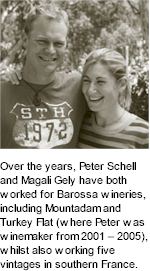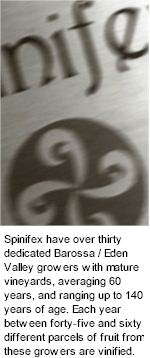


Spinifex make small quantities of unique hand crafted regional wines from the Barossa and Eden Valleys. Spinifex are typically blended, as a more complete and complex, unique and characterful wine can be assembled from components that are the result of the interaction between variety, soil and meso-climate. Peter Schell makes all the wines at the estate winery in Bethany, Tanunda, where he also runs his own winemaking consultancy company. Over the years, the pair have both worked for Barossa wineries, including Mountadam and Turkey Flat (where Peter was winemaker from 2001 – 2005), whilst also working five vintages in the South of France. In 2001 Peter and Magali decided to start making their own wines, sourcing grapes from five old Barossa vineyards to complete about 400 cases in that first year.

Spinifex first opportunity was to source some great old vine Mataro growing in deep white drift-sand on the Barossa Valleys’ Western Ridge. As interest and demand for the couple's efforts grew, the decision was made to focus all attention and passion into what had by then become Spinifex Wines. The estate now have over 30 dedicated Barossa / Eden Valley growers with mature vineyards, averaging 60 years, and ranging up to 140 years of age. Each year between forty-five and sixty different parcels of fruit from these growers are vinified.
The majority of the Shiraz comes from high country vineyards at the foothills and from the Eden Valley. Grenache, Mataro, Cinsault and Carignan are sourced from warmer, lower altitude vineyard sites on the Barossa Floor. The philosophy behind Spinifex is based on hand-crafting wines which are unique and distinctive, reflecting the winemakers own tastes and preferences. The inspiration comes from a fusion of experiences in France over the years, the many great wines consumed during those trips, and the individuality and character of some fantastic old vineyards in the Barossa.
The focus is always on making regional wines from the traditional Mediterranean grape varieties that have been grown successfully in Australia for over 150 years - Shiraz, Mataro, Grenache, Cinsault, Carignan, Ugni Blanc, Grenache Gris, Marsanne and Semillon. The aim is to make wines that display signatures of vineyard provenance and vintage, show regional typicity and have a consistent thread of house style which reflect the mwkers experiences.

Spinifex are predominately blends, the synergies derived from blending wines of differing character enhance the subtle complexities, even textures and profound personalities delivered from great old vine vineyards. Peter Schell and Magali Gely share a commitment for the Barossa and hold a strong passion for the local wines. Spinifex has enticed with its choice of varieties, quality winemaking and individuality. What’s next?
Schell acquires fruit from little family growers, passionate people who are excited to sell grapes to someone who is interested in their vineyard. And they get a kick out of that and it makes life easier for everyone. Some fruit is sourced from vines as old as 60 years, with most grenache about 30 years old. That’s astounding. Then again, some of the shiraz and mataro Spinifex uses is 110-140 years old. The different parcels of grenache are also fermented separately until decision time as to what goes into what wine. There’s nothing arbitrary about it, says Schell, who's getting a handle on these old blocks and what they offer, their different characteristics. Spinifex harbour a special passion for Grenache. It’s certainly well suited to Australia, especially from a sustainability point of view, as it doesn’t require irrigation. But it’s on a bit of a downward spiral, laments Schell. With not enough winemakers getting behind the variety, there’s hardly an incentive for growers to improve or, indeed, plant more. And you can’t expect good wine unless you’ve got good fruit says Schell.
Spinifex also have a strong French connection, both physically and philosophically. Magali's family, who up until recently were vignerons with a long lineage in Lunel, near Montpellier, still live in southwest France. Over the years, Peter has worked six French vintages, in Provence, the Languedoc, Bordeaux and Burgundy. Time spent in the south of France has fuelled their interest in making unique, hand crafted wines with personality, which are generous and honest expressions of the Barossa.
